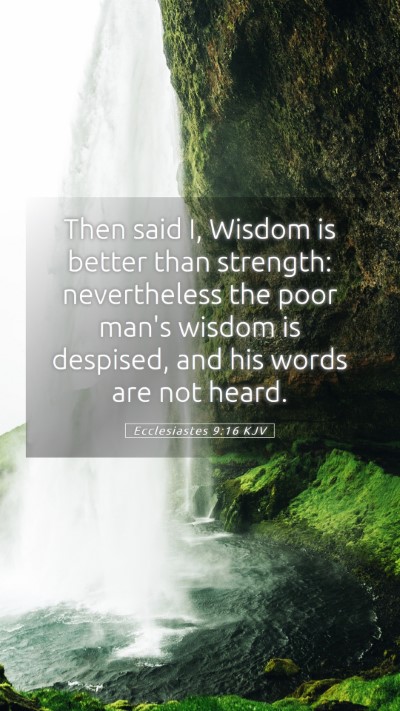Understanding Ecclesiastes 9:16: A Comprehensive Bible Verse Commentary
Bible Verse: Ecclesiastes 9:16
"And I said, Wisdom is better than strength; nevertheless the poor man's wisdom is despised, and his words are not heard."
Overview
Ecclesiastes 9:16 presents profound insights into the nature of wisdom and societal perception. This verse reveals a common human experience: despite the inherent value of wisdom, it often goes unrecognized and unappreciated, particularly when expressed by those in lowly positions. This commentary draws from the insights of notable biblical commentators such as Matthew Henry, Albert Barnes, and Adam Clarke.
Primary Themes
- The Value of Wisdom: Matthew Henry emphasizes that wisdom, though more powerful than mere strength, often finds itself overlooked.
- Social Perception: Albert Barnes elaborates on the irony that the wisdom of a poor man, regardless of its truth and value, is often dismissed.
- The Struggle for Recognition: Adam Clarke discusses how the messages of wisdom may not always resonate with society, especially when not coming from an authoritative or wealthy source.
Detailed Analysis
The verse illustrates a paradox in human behavior and societal norms. Here are several significant points derived from the combined insights of public domain commentaries:
The Superiority of Wisdom
Matthew Henry's Perspective: Matthews asserts that wisdom is indeed more valuable than physical strength. However, this acknowledgment does not necessarily translate to societal respect or recognition. In many instances, earthly wisdom is disregarded, while the powerful may dictate perceptions.
The Disregard for the Poor's Wisdom
Albert Barnes' Analysis: Barnes points out that the worth of wisdom is often overshadowed by the wealth and influence of those who lack it. The poor man, though wise, faces contempt because society does not always value his insights simply due to his social standing.
Cultural Implications of Wisdom
Adam Clarke's Commentary: Clarke emphasizes that wisdom's recognition is often connected to the speaker's status. Society tends to place value on appearance and affluence, leading to the neglect of critical truths if those truths are not delivered from a prominent position.
Practical Applications of the Verse
This verse challenges readers to reflect on how they value wisdom and who they listen to. It encourages individuals, especially in bible study groups or during online bible study sessions, to recognize the insights that can come from unexpected places.
For Personal Reflection
- Consider how you respond to advice from those with less influence or wealth. Do you value wisdom for its own sake?
- Reflect on your own experiences where you may have undervalued the insights of individuals based on their social status.
Cross-References to Ecclesiastes 9:16
- Proverbs 23:23: "Buy the truth, and sell it not; also wisdom, and instruction, and understanding."
- Ecclesiastes 7:12: "For wisdom is a defense as money is a defense; but the excellence of knowledge is that wisdom gives life to those who have it."
- James 3:17: "But the wisdom that is from above is first pure, then peaceable, gentle, and easy to be entreated, full of mercy and good fruits, without partiality, and without hypocrisy."
Conclusion
Ecclesiastes 9:16 serves as a poignant reminder of the valuable yet frequently unassumed wisdom found in people from all backgrounds, particularly the impoverished. The interpretation of this verse invites believers to practice discernment and appreciation for wisdom irrespective of the speaker's societal status. The insights gained from public domain commentaries deepen our bible verse understanding and encourage broader perspectives in bible study resources.


